
No more and not just a protest vote, but a vote of “adhesion”. The great success of National Rally at the polls in France it is due to transversal support between social classes and territories. Where the xenophobic and anti-immigration component “is fundamental”: “The voters agree or at least accept it”, he explains to ilfattoquotidiano.it Safia Dahanipost-doctoral sociologist atÉcole des Hautes Études en Sciences Sociales et al Center Européen de Sociologie et de Science Politique, where he deals with the legitimation of the far right. The RN has not changed, what happened was a “normalization” of concepts that “no longer cause debate”. From Nicolas Sarkozy onwards, reaching the presidency of Emmanuel Macron with the government of Gabriel Attal, there has been a gradual move towards the far right. Which helped the so-called de-diabolization of a party still firmly in the hands of Marine Le Pen.
How is the Rassemblement National electorate structured today?
We define it as an “electoral conglomerate” because it unites different class fractions and is not homogeneous. The current structure is linked to a radicalization of old right-wing voters who move towards a far-right vote. According to sociologists, we are not necessarily in a protest or contestation vote, but in a membership vote. They are voters who now regularly vote for the far right.
The Ipsos analysis says that the RN has grown in all social classes, except among the richest. Was it the support of the popular classes that made the difference?
There are different social classes that vote for the far right, not just the popular or upper classes. We must pay attention to what we mean by popular class: worker, employee… they do not have the same material conditions. And we must not forget that the working-class electorate with all its diversity has never been completely to the left.
How do you explain the great success of the last elections?
It’s no surprise, the RN performs well at the European Championships. In 2014, then in 2019, they came out on top. Only this time second place is much further away. Furthermore, we need to talk about the left which was divided and the structural abstention in the last 15-20 years.
Why would a voter choose Rassemblement National at this time?
It’s very difficult without looking at individual groups that don’t necessarily have the same interests. What we can say is that there is a racist and xenophobic dimension that is not exactly said that way by the voters, but which is accepted by a large part.
So is the adhesion also to xenophobia and Islamophobia?
They are important in the sense that the program is organized around these dimensions. National preference (or the principle according to which the French should be favored over foreigners ed), the fact of systematically remembering that money can be recovered by eliminating the so-called advantages for immigrants. When you vote for them you cannot ignore these aspects. So voters either agree or accept them.
And over time have they become institutionalized or radicalized on these issues?
Since the 1980s, the migration issue has been central to their programs. Today there is less resistance than before to speaking, for example, of national preference. An expression that was also present in President Macron’s immigration law. There has been a form of normalization of these ideas which are not as much debated as they were forty years ago.
Has Macron favored it by chasing the far right?
I don’t know, there are no specific studies on this. On the contrary, in terms of collective, political and journalistic narration, there are forms of normalization of the way of expressing the world. National preference, ethnic substitution, are concepts that we can hear about from journalists or read in editorials without creating debate.
And does Macron have responsibility?
I cannot say whether the President of the Republic is responsible. We can say that at least from Nicolas Sarkozy onwards there has been this attempt to speak to the far-right electorate to bring them back to the right. It’s not just about the president. But also of the government, of the ministers, of the deputies. Who no longer systematically raise their shield in the face of the far right. For example, we saw it in the 2022 legislative elections, when the deputies of En Marche (Macron’s party ed.) have not all given clear indications of voting left against the far right in the second round. They are symbols so that little by little they showed the acceptability of the Rassemblement National.
But are they still perceived as far right?
Being “far right” in politics is a stigma. I have worked on RN managers and when you talk to them they deny being one, they try to make distinctions. For some time in the journalistic space there has been the idea that we should rather talk about a radical right-wing or populist party. These are all elements that contribute to the normalization of what we can scientifically characterize as far-right. That is, a vision of the world that selects people according to their social, ethnic and religious origins. Groups which, according to the RN, are unequal among themselves. Also fundamental is the idea of a common enemy to fight which calls into question the national identity and the image of the true Frenchman. So yes, scientifically we can say that it is a far-right party. We must be wary of political and journalistic strategies to change the narrative.
In the past there was talk of an operation to de-diabolize Le Pen. It is still in progress?
That is the party’s strategy. But it cannot be considered without the dexterity and extreme dexterity of the political and media field such that today, if on a plateu on television a left-wing candidate recalls the origins of an RN candidate, the journalist himself considers it an irrelevant intervention.
How did we get to this point?
Meanwhile, the far right has moved ever closer to the right. Let’s not forget that with Sarkozy as president we had the Ministry of Identity and Immigration. Then there was the effect: “They have voters so they are democratic and we need to talk about it.” Finally, let’s not forget that spokespersons were mediatized very early on, even when they had little power.
How is the ruling class of the RN made up?
Before entering the National Assembly, the vast majority of them were far-right militants. They are representatives of the upper classes, a bit like in all parties, they have economic and educational capital. Since the 1970s no worker has occupied an important position in the party’s general staff. Under Marine Le Pen then, there was an attempt to recruit people who come from the right, political professionals and with a network. But these are not the majority.
What has Bardella’s arrival changed in the management of power?
The party still revolves around Le Pen. You are president of the group in the National Assembly, you will be a presidential candidate. Bardella is part of her family and she pushed him.
Is it no longer a vote of anger?
In the literature it has been said for some time that this is a protest vote with the idea of somewhat frustrated popular classes finding themselves in this populist party which gives them somewhat simple explanations. I’ve never really agreed. When we go to do field investigations with voters, militants or leaders of the RN, we realize that they believe us. They really have the idea that migrants are a problem and that we need to fight them. We have to say it. Voters are not passive people who do not reflect. Furthermore, I think that all parties at a certain moment question the status of things and are not therefore protestors. But they adhere to a vision.
Did the geopolitical and economic context give impetus to the Rassemblement National?
With the return of war in Europe, new questions were raised, however the analysis of the link with the RN vote is complex. On the one hand, journalistic work in France shows that the party is rather pro-Russia, with leaders who have had relations with Moscow. On the other hand, in terms of purchasing power it is true that there has been pauperisation and there are many people in difficulty. And that there are parts of the popular classes who consider the RN a solution, but we must not forget that their program is very liberal and very right-wing. And not exactly on the side of those exploited by capitalism. Some turn to them because they think that the enemy in difficult economic conditions is the one who is at the bottom, such as the immigrant.
But have Macron’s belligerent speeches or the debate on Le Pen’s closeness to Russia had an effect?
It’s hard to say because there is no investigation. We must always separate what happens in the political-journalistic field from what happens at the level of voters. For example, during the electoral campaign, most parties recalled that Bardella did nothing in the European Parliament and this did not prevent the RN from obtaining more than 30%.
What do you expect from the next legislative elections?
What political observers say is that participation can benefit the far right because they are part of a mobilization dynamic. The proximity to the last European elections, where they managed to mobilize the electorate, favors them.
Is the time when legislative elections were an obstacle for the RN over?
If before they might have had difficulty finding local candidates, this is not the case now. They also formed an alliance with around fifty right-wingers. It’s proof that it’s now no problem to be a far-right candidate.
What has surprised you about the dynamics of the last few weeks?
The dissolution. It is surprising that a President of the Republic decides to dissolve the National Assembly and to do so after coming second, fifteen points behind the far right and with the left divided. We were all surprised when we heard it on TV. I would even say shocked. The next elections will not be surprising: the RN will come first, behind the new united front of the left and third the right and Macron. I don’t see how it can change.





